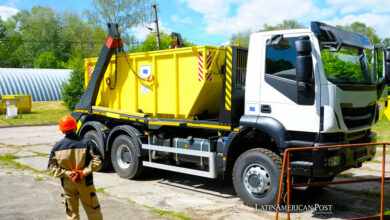Commodity Giants Commit to Protecting South American Ecosystems
Eight leading commodity traders, including ADM and Cargill, pledge to cease soy purchases from farms harming South American grasslands, reinforcing their commitment against deforestation and bolstering conservation efforts in ecologically rich areas like Brazil's.,

Photo: Adobe Stock
Latin American Post Staff and EFE
Listen to this article
Leer en español: Gigantes de las materias primas se comprometen a proteger los ecosistemas sudamericanos
Commitment to Environmental Conservation
In a landmark decision aligned with global environmental conservation efforts, eight of the world's top commodities traders have made a substantial commitment to the future of South America's ecosystems. On the fringes of the COP28 climate summit, these firms, which include prominent names like Archer Daniels Midland, Bunge, Cargill, and Louis Dreyfus Company, announced their pledge to halt the purchase of soy from farms implicated in the destruction of crucial grassland areas.
This move represents a significant stride towards protecting the Cerrado, Brazil's vast and biodiverse savanna, which has degraded at least half of its expanse due to agricultural expansion. Agriculture, forestry, and other land-use practices significantly contribute to global warming, accounting for over a fifth of the planet's greenhouse gas emissions. The new commitment from these trading giants adds a crucial layer to their previous vows to avoid soy suppliers involved in deforestation.
Cerrado's Urgent Need for Conservation
The Cerrado, a critical ecological frontier, has become Brazil's fastest-growing agricultural hub, increasing environmental concerns. In 2023, the region saw its highest level of destruction in eight years, underscoring the urgent need for concerted conservation efforts. Therefore, the pledge by these companies comes at a pivotal moment for the Cerrado and other vital ecosystems like the Amazon rainforest and Chaco dry woodlands.
The agreement, as outlined by Petra Tanos of the Tropical Forest Alliance, a World Economic Forum initiative, stipulates that by this decade, these firms will no longer source soy from farms that have destroyed any non-forest natural vegetation in these critical areas. This aligns with the sector's commitment to eliminating deforestation from their supply chains by 2025.
Aggressive Environmental Commitments
Several companies announced even more aggressive environmental commitments in the buildup to the United Nations COP28 climate change summit in Dubai. Cargill, for instance, declared its intention to eradicate deforestation and land conversion in its supply chains by 2025 across Brazil, Argentina, and Uruguay. Similarly, Archer Daniels Midland committed to eliminating land conversion among its direct suppliers by 2025 and indirect suppliers by 2027, focusing on sensitive South American biomes.
These pledges mark a critical step forward in the global fight against climate change and environmental degradation. South America, home to some of the most biodiverse ecosystems on the planet, has long been threatened by extensive agricultural development. The region's natural vegetation is often cleared to make way for vast soy farms, contributing significantly to global deforestation rates.
Industry's Mixed Track Record
However, the industry's track record of meeting past commitments has been mixed. In 2010, hundreds of consumer brands pledged to achieve "net zero" deforestation by 2020, a goal that ultimately was not met. This historical context adds a layer of skepticism. It highlights the importance of transparency and accountability in implementing these new commitments.
The move by these commodity giants is more than an environmental decision; it is a recognition of the interconnectedness of global trade, agriculture, and the environment. By aligning their business practices with sustainable development goals, these companies are proactively preserving some of the world's most critical habitats. The success of these commitments will depend not only on the adherence of these companies to their pledges but also on the collaboration between governments, civil society, and the private sector to create a more sustainable and environmentally conscious global agricultural model.
Also read:Diageo's Long-Term Growth Strategy: Navigating Latin American Challenges
As the world watches the outcomes of the COP28 climate summit and these corporate pledges unfold, it becomes increasingly clear that preserving our planet's ecosystems is not just an environmental issue but a crucial aspect of global economic and social sustainability. This collective action by some of the leading players in the commodities trade could signal a turning point in how business is conducted in some of the world's most ecologically sensitive regions.




